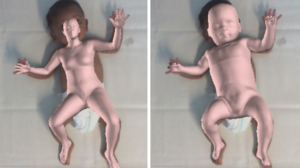Learning and Tracking the 3D Body Shape of Freely Moving Infants from RGB-D sequences
2020
Article
ps
Statistical models of the human body surface are generally learned from thousands of high-quality 3D scans in predefined poses to cover the wide variety of human body shapes and articulations. Acquisition of such data requires expensive equipment, calibration procedures, and is limited to cooperative subjects who can understand and follow instructions, such as adults. We present a method for learning a statistical 3D Skinned Multi-Infant Linear body model (SMIL) from incomplete, low-quality RGB-D sequences of freely moving infants. Quantitative experiments show that SMIL faithfully represents the RGB-D data and properly factorizes the shape and pose of the infants. To demonstrate the applicability of SMIL, we fit the model to RGB-D sequences of freely moving infants and show, with a case study, that our method captures enough motion detail for General Movements Assessment (GMA), a method used in clinical practice for early detection of neurodevelopmental disorders in infants. SMIL provides a new tool for analyzing infant shape and movement and is a step towards an automated system for GMA.
| Author(s): | N. Hesse and S. Pujades and M.J. Black and M. Arens and U. Hofmann and S. Schroeder |
| Journal: | IEEE Transactions on Pattern Analysis and Machine Intelligence (TPAMI) |
| Volume: | 42 |
| Number (issue): | 10 |
| Pages: | 2540--2551 |
| Year: | 2020 |
| Department(s): | Perceiving Systems |
| Research Project(s): |
Bodies from RGB-D
|
| Bibtex Type: | Article (article) |
| Paper Type: | Journal |
| DOI: | 10.1109/TPAMI.2019.2917908 |
| Institution: | IEEE |
| Links: |
pdf
Journal |
|
BibTex @article{Hesse:PAMI:2019,
title = {Learning and Tracking the {3D} Body Shape of Freely Moving Infants from {RGB-D} sequences},
author = {Hesse, N. and Pujades, S. and Black, M.J. and Arens, M. and Hofmann, U. and Schroeder, S.},
journal = {IEEE Transactions on Pattern Analysis and Machine Intelligence (TPAMI)},
volume = {42},
number = {10},
pages = {2540--2551},
institution = {IEEE},
year = {2020},
doi = {10.1109/TPAMI.2019.2917908}
}
|
|



